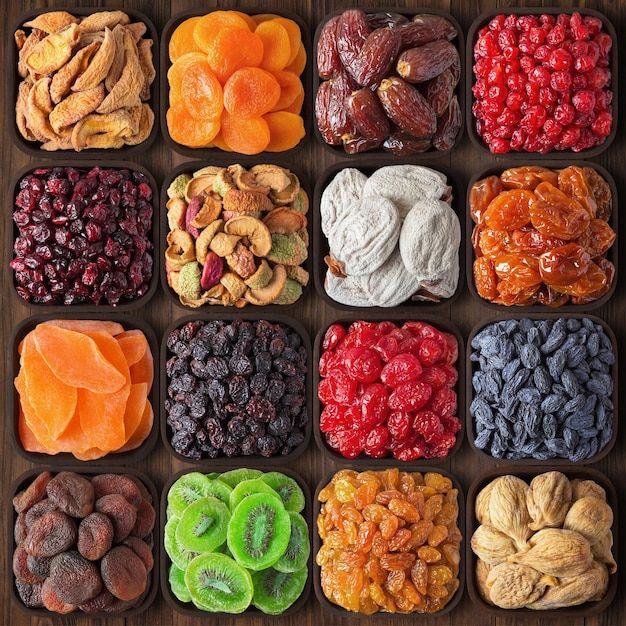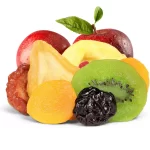Introduction to Dried Fruit
Does dried fruit have vitamin c? Dried fruits are loved for their sweet taste and long shelf life. They provide a convenient way to enjoy the flavors and nutrients of fresh fruit in a more durable form.

How Dried Fruits Are Made
Dried fruits undergo dehydration, a process removing most water content. This ancient method preserves fruit, extending its shelf life significantly without substantial nutrient loss.
Nutritional Content and Retention in Dried Fruits
Though the water is gone, many vitamins, minerals, and fibers remain in dried fruits. Antioxidants like polyphenols are often found in higher concentrations due to the fruit’s condensed nature. However, vitamin C, being sensitive to heat, can diminish slightly during the drying process.
The Role of Vitamin C in Nutrition
Vitamin C is pivotal for overall health. It bolsters the immune system, aids in tissue repair, and acts as an antioxidant.
Benefits of Vitamin C for Health
Vitamin C has multiple health benefits. It helps protect against heart disease and boosts skin health. It also improves iron absorption from plant-based foods.
Daily Recommended Intake of Vitamin C
Adults need 75-90 mg of Vitamin C daily, according to health guidelines. Women should aim for 75 mg, and should aim for 90 mg. This intake supports bodily functions and prevents deficiency diseases.
Comparing Dried and Fresh Fruits
When considering dried versus fresh fruits, one should be mindful of their differences.
Nutritional Differences Between Dried and Fresh Fruits
Dried fruits offer similar vitamins and minerals as fresh fruits but in a more concentrated form. For example, while fresh fruit contains more water, dried fruits pack more nutrients by weight. Consequently, a small serving of dried fruit can provide a significant nutrient boost. However, the drying process does reduce some heat-sensitive vitamins, such as vitamin C, in comparison to their fresh counterparts.

Caloric and Sugar Content Comparison
Dried fruits are higher in calories and sugar content than fresh fruits. This is because removing water from fruit concentrates its natural sugars. Therefore, although they may offer a convenient source of vitamins and minerals, portion control is necessary. Ideally, to manage caloric intake, one should consume smaller quantities of dried fruits than they would with fresh fruits.
Vitamin C in Dried Fruits
Dried fruits are a tasty, nutrient-rich snack option that also happens to be a good source of vitamin C.
List of Dried Fruits Rich in Vitamin C
Some dried fruits are particularly high in vitamin C. Examples include:
- Dried guavas: These are packed with vitamin C.
- Dried kiwis: They retain much of their vitamin C content even after drying.
- Dried papayas: These tropical fruits offer a good dose of your daily vitamin C needs.
- Dried strawberries: They maintain a significant amount of vitamin C during the drying process.
- Dried lychees: These are another excellent source of vitamin C.
Remember, the amounts of vitamin C in dried fruits can vary based on processing methods.
Optimal Ways to Consume Dried Fruits for Vitamin C
When eating dried fruits for vitamin C, keep these tips in mind:
- Mix dried fruits with nuts for a balanced snack.
- Add them to cereal or yogurt to start your day with a vitamin C boost.
- Stick to proper portion sizes to limit sugar and calorie intake.
- Check labels for added sugars which can offset the health benefits.
By being mindful of the portion size and processing, you can enjoy the vitamin C benefits from dried fruits.
The Role of Dried Fruits in a Balanced Diet
Incorporating dried fruits into a balanced diet can enhance nutritional intake conveniently. These fruits, rich in vitamins, minerals, and fiber, support daily nutrition and health maintenance efficiently.
Incorporating Dried Fruits into Everyday Meals
Adding dried fruits to everyday meals is an easy way to boost vitamin and mineral intake. Here are simple ways to include them:
- Sprinkle dried fruits on your morning cereal or oatmeal.
- Mix them into baked goods like muffins or pancakes for a naturally sweet touch.
- Toss a handful into your salad for a sweet and tangy flavor.
- Blend dried fruits into smoothies for a nutrient-packed beverage.
Snacking Smart with Dried Fruits
Choose dried fruits as a smart snacking option to keep energy levels up between meals. Here’s how to snack smartly:
- Keep portion sizes small to control sugar and calorie intake.
- Opt for unsweetened versions to avoid added sugars.
- Pair dried fruits with nuts or yogurt for a balanced snack.
- Use them in homemade trail mix for a portable snack option.
Choosing dried fruits can contribute significantly to your daily nutrient requirements while offering a convenient and delicious way to snack.
Pros and Cons of Dried Fruits
Advantages of Including Dried Fruits in Diet
Dried fruits boast several benefits making them an ideal dietary addition. These include:
- High Nutritional Value: Dried fruits are nutrient-dense, offering a concentrated source of vitamins and minerals such as iron, potassium, and certain B vitamins.
- Convenience: They are easy to store and transport, making them perfect for snacking on the go.
- Long Shelf Life: Due to the removal of water during processing, dried fruits can be stored for much longer than fresh fruits without spoiling.
- Energy Boost: Their natural sugars provide a quick energy source, ideal for a pre-workout snack or a mid-day energy surge.

Points of Caution When Consuming Dried Fruits
While dried fruits are a healthy choice, there are some considerations to keep in mind:
- Sugar Content: Dried fruits contain concentrated sugar levels, potentially leading to higher calorie intake.
- Portion Sizes: Due to their small size and high sugar content, it’s easy to overeat dried fruits. Always monitor portion sizes.
- Added Sugars and Preservatives: Some manufacturers add extra sugars or preservatives. Always check the ingredient list to avoid these additives.
- Dental Health: The sticky texture of dried fruits can adhere to teeth, increasing the risk of dental cavities. Brushing teeth after consuming dried fruits is advisable.
Incorporating dried fruits into a balanced diet offers numerous health benefits, but moderation is key to managing their high sugar content and potential additives.


